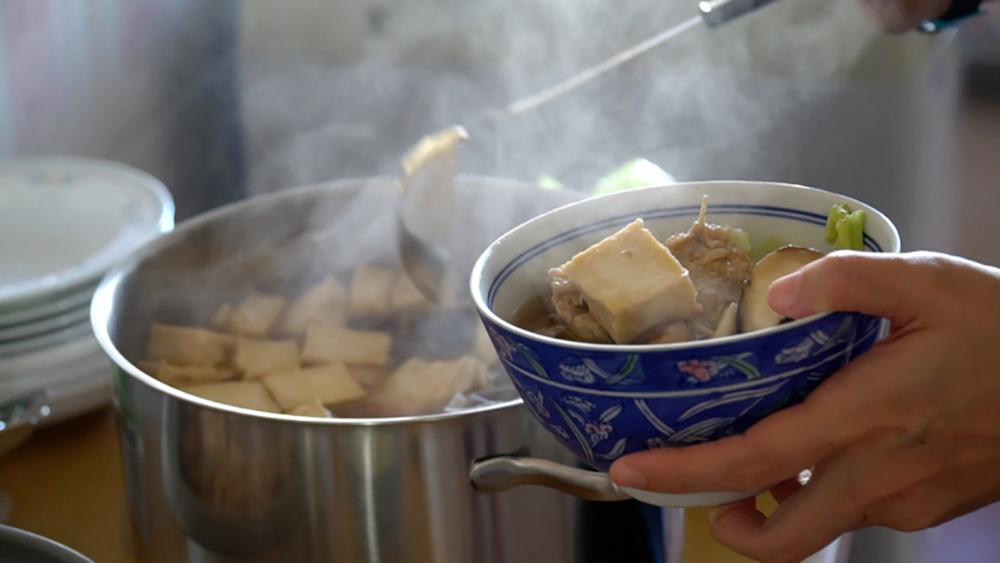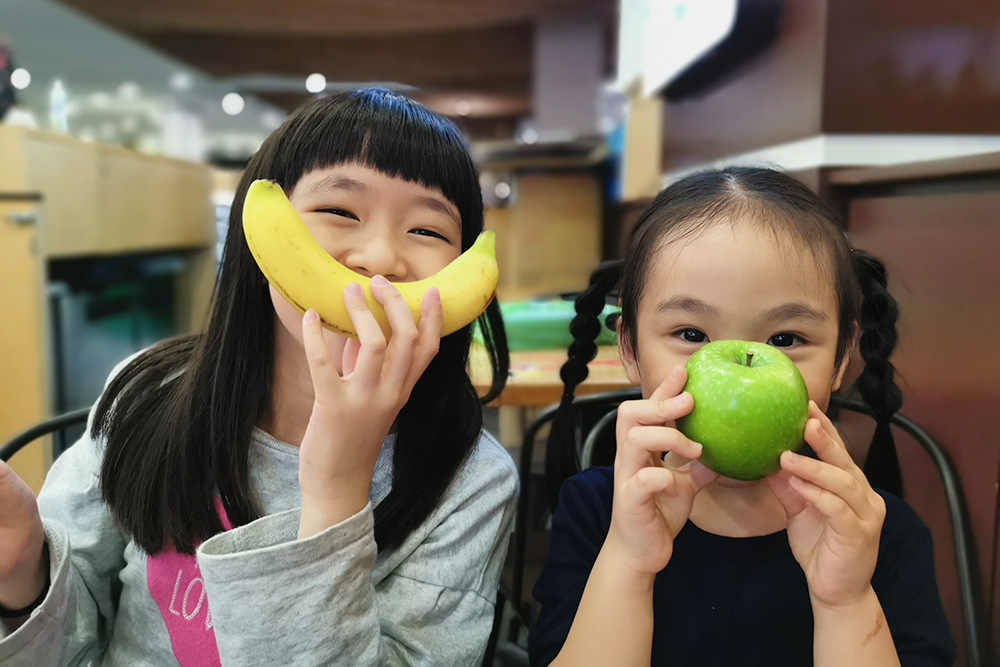 If we could practice sustainability through our daily meals, would we be willing to make the change? (Screenshot from video)
If we could practice sustainability through our daily meals, would we be willing to make the change? (Screenshot from video)
Bak kut teh is a renowned yet economical Nanyang delicacy with a wide variety of ingredients. Did you know that bak kut teh is also equally delicious when wholly prepared using vegetarian ingredients? After trying vegetarian bak kut teh, Mr Hu Wei Kai said, “The broth is rich, yet it has a unique taste. The dish smells, looks and tastes great!” Mr Hu, who seldom eats vegetables, added that he is now more willing to have vegetarian meals.
With the COVID-19 outbreak, mankind is now facing more pressing public health and environmental crises. To quote Dharma Master Cheng Yen:
“We must go vegetarian ourselves.”
“We must share this with others.”
“We must promote vegetarianism to all.”
If people could change their eating habits and go on to promote such changes in their spheres of influence, we would be one step closer to achieving environmental sustainability.
In July 2020, volunteers from Tzu Chi Foundation (Singapore) brainstormed how more people could be encouraged to adopt vegetarianism. Suggestions included inviting friends and colleagues to order vegetarian food, and going into the heartlands during the first and fifteenth day of the Lunar month to promote vegetarianism. Additionally, the idea of a “Veggie Kitchen” was born amidst the discussion. With volunteers playing host, inviting friends over to cook vegetarian food, such practical actions would encourage friends and family to learn how to prepare and enjoy vegetarian food.
Since the launch of “Veggie Kitchen” last August, more than 50 such sessions have been held, involving over 300 participants. This initiative has gained momentum, so much so that more than 10 volunteers have since loaned their kitchens for people to “tuck into vegetarian meals” regularly. Over the heartwarming meals, volunteers also share their views regarding the benefits of vegetarianism for personal health and environmental sustainability in a bid to bust the myth of vegetarian food being unpalatable, thereby encouraging participants to adopt healthier eating habits.
Volunteer Lim Ah Lean is one such volunteer who enjoys holding “Veggie Kitchen” sessions at her residence. On 28 March 2021, she played host again, inviting her new friends over to share with them how to prepare scrumptious vegetarian food in the hopes of spreading it further to more people, thereby protecting more animals.
On this day, she chose to prepare delicacies full of Nanyang flavour - vegetarian bak kut teh and yam rice. She explained that the reason for choosing this dish was because the ingredients are easily accessible and easy to prepare, and the dishes are delicious with high nutritional value.
Recipe by Mr Hu Wei Kai:
Heat up a pot of water, then add the herbal soup pack. After an hour, add mock mutton, mushrooms, enoki mushrooms, fried beancurd skin, tau pok, then add a suitable amount of condiments such as black soy sauce, light soy sauce, salt and mushroom powder. Simmer for 10 minutes before serving!
“For someone who eats meat, mock meat’s texture may not fully match that of real meat’s, but it’s definitely worth a try! The broth is flavourful, full of aroma and colour,” Mr Hu exclaimed. He added that even though he does not eat vegetables, he is now willing to give himself an opportunity to do so.
Mr Alex Fung, who is not entirely vegetarian, acknowledged that he has already been eating less meat and more vegetables. He realised that eating vegetarian reduces the burden on his body, as many vegetables contain dietary fibre that promotes digestion. In the long run, going vegetarian can be more beneficial than having a meat-based diet, as it reduces constipation.
“The nutrients from meat can actually be obtained from fruits and vegetables as well. As the human body does not require much, a moderate amount is sufficient. As long as one adopts vegetarianism with a scientific approach, understands the nutritional content in various types of fruits and vegetables, and eats in moderation, vegetarianism would not be detrimental to one’s health,” said Ms Chen Qian Wen, who has a Food Science degree.
Vegetarianism is a lifestyle that allows humans to have a symbiotic relationship with Mother Nature. Supporting it also entails protecting Mother Earth and loving it. A large number of animals have to be farmed to fulfil humans’ demand for meat, and the significant emissions by the livestock industry is a leading cause of global warming. Ms Lin Mei Yin, an environmentalist, added that raising animals requires large amounts of corn, and in order to cultivate sufficient corn, widespread deforestation has taken place. With the Amazon rainforest being compromised, global warming has worsened.
Ms Tan Kah Noi, who has been a vegetarian for 10 years, exclaimed that the livestock industry has depleted large amounts of food. Yet, there are still people in many impoverished regions who suffer from hunger. If the food could be used for human consumption instead, then food insecurity in many regions can be mitigated. She added that animals, like humans, fear and grieve the most about death and treasure life the most. To fulfil humans’ appetite for meat, many innocent lives have to be sacrificed. On Earth, countless animals are killed and slaughtered every second. Hence, the more vegetarian meals we eat, the lesser the killing.
 Today’s “Veggie Kitchen” is serving Nanyang delicacies - vegetarian bak kut teh and yam rice. Over the meal, participants share their joys in preparing and eating vegetarian food. (Photo provided by Chen Qian Wen)
Today’s “Veggie Kitchen” is serving Nanyang delicacies - vegetarian bak kut teh and yam rice. Over the meal, participants share their joys in preparing and eating vegetarian food. (Photo provided by Chen Qian Wen)
The biggest difficulty in promoting vegetarianism is exploring one’s palates to enjoy the intricacies of the taste of vegetarian food. Many people think that eating vegetarian entails giving up scrumptious delicacies, but being vegetarian allows one to feel at peace, so why not do so?
Adhering to the prevailing Safe Management Measures, “Veggie Kitchen” is only open to 8 participants per session. Even then, Tzu Chi volunteers have managed to spread awareness of their initiative in the community with their love and determination. Vegetarianism is the best way to practice love for self, animals and the Earth. Practising vegetarianism starts with you and me today!


